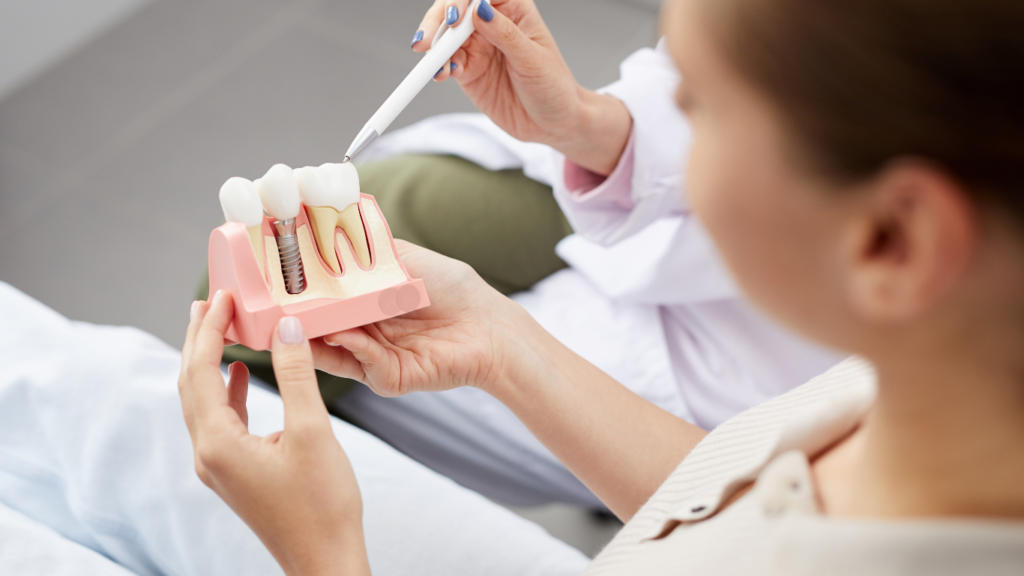Dental implants are a revolutionary solution for restoring missing teeth, offering durability, functionality, and a natural appearance. To ensure your dental implants remain in excellent condition for years to come, proper care is essential.
Whether you’re new to implants or looking for tips to refine your oral care routine, this guide will walk you through the best practices to protect your investment and maintain your oral health.
Understanding Dental Implants
Dental implants are titanium or zirconia posts surgically placed into the jawbone to serve as artificial tooth roots. Over time, they fuse with the bone through a process called osseointegration, providing a stable base for crowns, bridges, or dentures.
While implants are highly durable, they require proper maintenance to prevent complications like peri-implantitis, a condition similar to gum disease that can jeopardize the implant’s stability.

The Importance of Implant Care
Caring for your dental implants is crucial for several reasons:
Longevity: With proper care, implants can last a lifetime. Neglecting them can lead to failure or the need for costly replacements.
Oral Health: Healthy gums and surrounding teeth are essential for implant success. Poor oral hygiene can lead to infection or bone loss around the implant.
Aesthetic Appeal: Regular care ensures that your implant and prosthetic tooth stay clean and look natural.
Essential Care Tips for Dental Implants
Brush Twice Daily with the Right Technique
Treat your dental implants like natural teeth by brushing at least twice a day. Use a soft-bristled toothbrush to avoid scratching the implant surface or irritating the gums.
Electric toothbrushes are an excellent option, as they can clean more thoroughly without excessive pressure.
Brushing technique tips:
- Angle the brush at 45 degrees to clean along the gumline.
- Use gentle, circular motions.
- Brush for two minutes, covering all surfaces of your teeth and implant crowns.
2. Choose the Right Toothpaste
Not all toothpaste is suitable for dental implants. Avoid abrasive formulas that can scratch the surface of the implant or crown. Opt for a non-abrasive toothpaste to strengthen surrounding teeth and protect against decay.
3. Floss Daily to Prevent Plaque Build-Up
Plaque can accumulate around implants just like it does on natural teeth, increasing the risk of gum inflammation. Flossing daily removes food particles and plaque in areas your toothbrush cannot reach.
Recommended flossing tools for dental implants:
Dental Floss: Use implant-specific floss, such as super floss, designed to clean around implants and under bridges.
Water Flossers: These devices use a stream of water to clean effectively between teeth and around implants, offering a gentle alternative to traditional floss.
4. Use an Antibacterial Mouthwash
Rinsing with an antibacterial mouthwash helps reduce bacteria in the mouth, minimizing the risk of infection around the implant. Choose an alcohol-free mouthwash to avoid irritation or dryness.
5. Avoid Hard or Sticky Foods
While implants are designed to handle normal chewing forces, excessively hard or sticky foods can cause damage to the implant crown or abutment.
Avoid items like hard candies, ice, or caramel. Instead, opt for softer foods that are less likely to stress your implants.
6. Schedule Regular Dental Check-Ups
Routine dental visits are vital to monitor the health of your implants. During these visits, your dentist will:
- Examine the implant and surrounding tissues for signs of infection or inflammation.
- Perform professional cleanings to remove plaque and tartar.
- Assess the fit and condition of the prosthetic tooth.
Most dentists recommend check-ups every six months, though your dentist may adjust the frequency based on your individual needs.
7. Avoid Tobacco Products
Smoking or using tobacco products significantly increases the risk of implant failure. Nicotine in tobacco products disrupts blood flow, slowing the healing process and increasing the likelihood of infection or bone loss around the implant.
If you smoke, consider quitting to protect your investment and improve your overall health.
8. Protect Your Implants During Physical Activity
If you participate in contact sports or activities with a risk of facial impact, wear a mouthguard to protect your implants and natural teeth. Custom-fitted mouthguards provide the best protection and comfort.
9. Maintain a Balanced Diet
A healthy diet supports your overall oral health and promotes the longevity of your implants. Include foods rich in calcium, phosphorus, and vitamins D and C to strengthen your bones and gums.
Limit sugary or acidic foods and beverages, as these can contribute to plaque build-up and gum irritation.
10. Address Bruxism (Teeth Grinding)
If you grind your teeth, you may be putting excessive pressure on your implants, potentially causing damage. Speak to your dentist about solutions such as wearing a night guard to protect your teeth while you sleep.
Warning Signs to Watch For
Even with proper care, complications can arise. Contact your dentist immediately if you notice any of the following:
- Persistent pain or discomfort around the implant.
- Swollen, red, or bleeding gums near the implant.
- Mobility or looseness of the implant or prosthetic tooth.
- Pus or discharge from the implant site.
Early intervention can prevent minor issues from escalating into major problems.
Why Proper Implant Care Matters
The success of dental implants relies on a combination of professional expertise and patient care. By adopting a diligent oral hygiene routine and making healthy lifestyle choices, you can:
- Ensure the long-term stability of your implants.
- Maintain the health of surrounding teeth and gums.
- Enjoy the confidence and convenience that come with a fully functional smile.

Closing Thoughts
Dental implants are a significant investment in your oral health and quality of life. By following these essential care tips, you can maximize the lifespan of your implants and maintain a beautiful, healthy smile. Regular brushing, flossing, and dental check-ups, coupled with a balanced diet and healthy habits, form the foundation of implant success.
If you have any questions or concerns about your dental implants, don’t hesitate to contact your dentist.
Modern Day Dental – Dental Implants – St. Johns, FL
Are you considering dental implants or looking for expert advice on maintaining them? Book an appointment with our team today and let us help you achieve a smile that lasts a lifetime!

